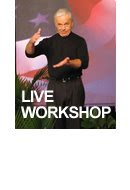Bill Bartmann was indicted on 57 federal felony counts in 2002; Attorney General, John Ashcroft alleged that he was guilty of making fake transactions to shell companies in order to falsify his balance sheet.
Bill Bartmann said, “Ashcroft’s action was after two grand juries voted not to indict. I didn’t know if it was a slow new week at the Justice Department or whether he hoped to find the next Enron-type scandal. All I knew was that I faced a cumulative 600 years in prison if convicted.
Bill Bartmann went into survival mode as he faced the situation head-on. He chose to be honest with his family and not try to sugar coat anything. “The natural inclination is to attempt to shield the ones you love,” said Bartmann, “but your desire to protect will produce the opposite result. Silence allows them to conjure up the most dreaded of possibilities.”
It was a very painful experience for Bill Bartmann, his wife and two young daughters as they witnessed all 89 days of his trial. His wife and daughters watched as the government produced more than 1,000 exhibits and called 53 witnesses in their effort to show Bartmann as a crook. “I produced zero exhibits and called no witnesses, because I had not broken the law,” said Bartmann. “My family also got to hear first-hand when the jury found me not guilty on all 57 counts.” A public statement was later made to confirm that Bill Bartmann had not committed any fraud.
Bill Bartmann was not guilty; however, he was devastated. The lifeblood of his company consisted of credit lines; those lines vanished at the hint of fraudulent activity. Bill Bartmann was a billionaire and the 25th richest person in America one day; bankrupt the next.
Bill Bartmann took steps to accept responsibility for his own actions. “People like winners, not whiners,” said Bartmann. Though he was not guilty of any crime, Bartmann was the head of a company employing 3,900 people, all of whom lost their jobs. “Accepting responsibility for a failure didn’t make me a bad human being – it instead made me a real human being.”
Bill Bartmann is not one to give up, no matter how bad things get. He didn’t wallow in bitterness and self-pity when the bankruptcy judge had a crew come to his home on Christmas week to chainsaw a hunk off his pool house; it was just a few feet over the one acre of land she would allow him to keep in bankruptcy.
Bill Bartmann would not have been able to move on and bounce back to success if he continued to relive the bad times. This is why he closed this chapter in his life and began writing the next one. Bill Bartmann concentrated his energy on building a thriving business of teaching entrepreneurs how to remove obstacles that stand in their way to success. His new book, Bailout Riches, has reached Amazon #1 world-wide best-seller status. The book shows ordinary people how to capitalize on the current government bailouts.
Bill Bartmann believes it is better to forgive others for their wrong doing rather than focusing on revenge which only produces negative energy. He learned that Attorney General, John Ashcroft would be at a book signing in Chicago while he was in town. Bill got in line, wearing a name tag that simply said, “Hi, My Name is Bill.” When he got to the head of the line, Ashcroft greeted him, saying “Hi Bill, where are you from?”
Bill said, “I’m from Tulsa.”
“Oh, really? We had a big case there a couple years ago.”
“Yes, I know. It was mine.” The color drained from his face as Ashcroft recognized Bill Bartmann.
“Mr. Ashcroft, you know now – and you knew then – that I was innocent. Your actions cost 3,900 people their jobs, and cost me $3.5 billion, not to mention enormous anguish on the part of my family. Mr. Ashcroft, I came here for one reason – to forgive you.”
Bill Bartmann turned and left before Ashcroft had a chance to react. He wasn’t concerned with his reaction; he did it for his own peace of mind and mental well-being.
Bill Bartmann says that when your world comes crashing down around you, your attitude toward failure will determine if you recover and become successful again. “Nature is all about regeneration,” said Bartmann. “You’re the most developed product of evolution up until this moment; you have the capacity for renewal.”
Bill Bartmann is the author of Bailout Riches: How Everyday Investors Can Make a Fortune Buying Bad Loans for Pennies on the Dollar. The book recently became an Amazon #1 world-wide best-seller. Bill Bartmann has been named “National Entrepreneur of the Year by USA Today, NASDAQ, Inc Magazine, Ernst & Young and the Kauffman Foundation.
Sunday, November 8, 2009
Sunday, April 26, 2009
Bill Bartmann Business Advice: Professional Phone Presentation
When people call your company, what do they hear? If you or an employee is at work, they likely hear your happy voices, but what if you are not around. What do they hear after hours or if all the phones are busy? You should have a professional recording that will pick up and take care of those customers. If you don't you stand the risk of losing a sale or even turning a potential customer off from you since you sound less than professional.
You need a professional after-hours and busy recording.
Clear Voice
Bill Bartmann's tip # 1 is the first thing you need to look for is a clear voice to give your message to potential callers. Remember, your phone message is your first contact with a potential customer who may call when someone else can't pick up. That means you need to make sure it is a voice that speaks clearly and well and seems to suit your company well. Perhaps your voice will be able to fit the bill. Some businesses hire professional voices to do their recordings.
Who They Are Calling
Bill Bartmann's tip # 2 is that first thing your professional after-hours and busy recording needs to have on it is a clear introduction of who they are calling. When people call your business they first want to make sure they have the right number. They also like to know they are really calling a legitimate business, so make sure you offer them a professional introduction.
Service You Offer
Bill Bartmann's tip # 3 is remember, the phone message that your callers are going to listen to is a replacement of a real person picking up the phone to talk to them. You need to make sure the message on the machine is just as thorough as you would be if you picked up the phone. Make sure the phone message mentions the services you offer and how you can help them.
Time and Location Information
Bill Bartmann's tip # 4 is one of the things that many people totally forget to put on their phone message is their location and their business hours. Many people who are calling are calling for just this information. Make sure you let them know when they should come to see you and where you are located! Give them your full address.
Website Information
Bill Bartmann's tip # 5 is even if it's after hours, is there a way people can get a hold of you online or at least look at what you have to offer? Why not send them there. Make sure your phone message gives them your website so they can go and read all about you and possibly even put in an order. There's nothing like making money while you're not even at the office!
Bill Bartmann offers very detailed due-diligence advice in his online course, Billionaire Business Systems. This course covers financial and legal issues of starting, owning and operating a business.
You need a professional after-hours and busy recording.
Clear Voice
Bill Bartmann's tip # 1 is the first thing you need to look for is a clear voice to give your message to potential callers. Remember, your phone message is your first contact with a potential customer who may call when someone else can't pick up. That means you need to make sure it is a voice that speaks clearly and well and seems to suit your company well. Perhaps your voice will be able to fit the bill. Some businesses hire professional voices to do their recordings.
Who They Are Calling
Bill Bartmann's tip # 2 is that first thing your professional after-hours and busy recording needs to have on it is a clear introduction of who they are calling. When people call your business they first want to make sure they have the right number. They also like to know they are really calling a legitimate business, so make sure you offer them a professional introduction.
Service You Offer
Bill Bartmann's tip # 3 is remember, the phone message that your callers are going to listen to is a replacement of a real person picking up the phone to talk to them. You need to make sure the message on the machine is just as thorough as you would be if you picked up the phone. Make sure the phone message mentions the services you offer and how you can help them.
Time and Location Information
Bill Bartmann's tip # 4 is one of the things that many people totally forget to put on their phone message is their location and their business hours. Many people who are calling are calling for just this information. Make sure you let them know when they should come to see you and where you are located! Give them your full address.
Website Information
Bill Bartmann's tip # 5 is even if it's after hours, is there a way people can get a hold of you online or at least look at what you have to offer? Why not send them there. Make sure your phone message gives them your website so they can go and read all about you and possibly even put in an order. There's nothing like making money while you're not even at the office!
Bill Bartmann offers very detailed due-diligence advice in his online course, Billionaire Business Systems. This course covers financial and legal issues of starting, owning and operating a business.
Tuesday, March 17, 2009
Bill Bartmann's Business Development Tips: Creating a Master-mind Group
The concept of the master-mind group was originally developed and implemented by Napoleon Hill, over 50 years ago. It has been proven to work for many serious entrepreneurs. The idea is to surround yourself with people who know more than you so you can benefit from this collective intelligence as you rise to a whole new level in life and business.
The master-mind group of only 4 or 5 is smaller than your advisory board, and the group is designed for everyone to help each other, where an advisory board is just focused on your business. The master-mind group provides a reciprocal trade of knowledge.
It is lonely at the top; you need a group of people who you can relate to, network with and learn from. Unlike your monthly, one hour meetings with your advisory board, you will meet with your master-mind group quarterly and the meetings will take place over two days at 6-8 hours each.
You will meet at a place completely disconnected from your life and business; this will be a sort of enrichment retreat for all of you. After the meeting, you and your distinguished group can enjoy some recreation, play some golf or have dinner, drinks and conversation.
The purpose of the master-mind group is to have the support of other individuals who are at your level of business, and who may be facing some of the same challenges you are. It is an opportunity to discuss things that you would not discuss at work or home. It is a chance to confide in others who you can trust will offer support and be discreet. What is said at the master-mind meeting stays at the master-mind meeting.
Here are some of the responsibilities and benefits of the master-mind group:
Sharpen skills while sharing business and personal experiences and knowledge
Honesty and loyalty while providing advice and opinions
Experience is our greatest teacher; learn from each others’ shared experiences
Group helps us be accountable, as we hold our employees accountable
Valuable support is provided by other business leaders who know what you don’t know.
A master-mind group is vital to personal and business growth. A master-mind group should provide each other an opportunity for growth, by sharing support, experience and knowledge needed to succeed in business.
Bill Bartmann has quarterly meetings with his master-mind group of like minded people who come together to provide value and to gain value within a group. Surround yourself with others who think like you do; who share similar interests as well as unique skills.
The master-mind group of only 4 or 5 is smaller than your advisory board, and the group is designed for everyone to help each other, where an advisory board is just focused on your business. The master-mind group provides a reciprocal trade of knowledge.
It is lonely at the top; you need a group of people who you can relate to, network with and learn from. Unlike your monthly, one hour meetings with your advisory board, you will meet with your master-mind group quarterly and the meetings will take place over two days at 6-8 hours each.
You will meet at a place completely disconnected from your life and business; this will be a sort of enrichment retreat for all of you. After the meeting, you and your distinguished group can enjoy some recreation, play some golf or have dinner, drinks and conversation.
The purpose of the master-mind group is to have the support of other individuals who are at your level of business, and who may be facing some of the same challenges you are. It is an opportunity to discuss things that you would not discuss at work or home. It is a chance to confide in others who you can trust will offer support and be discreet. What is said at the master-mind meeting stays at the master-mind meeting.
Here are some of the responsibilities and benefits of the master-mind group:
Sharpen skills while sharing business and personal experiences and knowledge
Honesty and loyalty while providing advice and opinions
Experience is our greatest teacher; learn from each others’ shared experiences
Group helps us be accountable, as we hold our employees accountable
Valuable support is provided by other business leaders who know what you don’t know.
A master-mind group is vital to personal and business growth. A master-mind group should provide each other an opportunity for growth, by sharing support, experience and knowledge needed to succeed in business.
Bill Bartmann has quarterly meetings with his master-mind group of like minded people who come together to provide value and to gain value within a group. Surround yourself with others who think like you do; who share similar interests as well as unique skills.
Bill Bartmann Tips: Business Partnerships
Is a partnership right for you? Creating a partnership for business can be a very good or a very bad decision. It is important that you understand how to form a partnership and how to avoid partnership problems before they destroy your business.
If you are considering an opportunity to enter into a partnership, then you must realize that a partner will offer something of value to your business. Also know that a conflict with a partner can seriously impact your business.
A business partnership is like a marriage; you cannot just fire your partner, as you can an employee. Your partner has an ownership interest in your business. Severing a partnership is a legal action, like divorce, and it can be very expensive, even leading to bankruptcy.
You must make this decision wisely; be sure that you are entering into the partnership for the right reasons. A friend or family member does not make one a good choice for a business partner. They must bring something of value that you need to run the business, whether it be money, knowledge & skills in a specific area, or attributes essential to your success.
Another key rule to entering into a partnership is to never go into a 50/50 partnership. Someone has to be in charge. If there should be a disagreement on a business decision, where the authority is 50/50, you will have come to an impasse where you will experience in-action.
It is fine to agree to a 50/50 revenue split, but one side of the partnership must be at least 51% managerial. This must be decided on upfront and understood that one of you will make final decisions. The one who has the 51% managerial position will promise to ask, seek council and respect the opinion of their partner before making the final decision.
Another important document that needs to be included in your partnership agreement is a Buy/Sell Agreement with a separation clause describing how one will buy the other out if one should want to leave the partnership for any reason. Whether it be due to disagreement or just because one is moving on to do pursue something different, it is very important to have a separation agreement in place ahead of time.
A business partnership has a greater chance of being successful if it is properly set up with a complete partnership agreement in place. The agreement must delegate who is in charge, the economics of the business, and the separation clause.
Some of the biggest businesses today began as partnerships; partnerships can be successful. But, be careful and make good choices at the beginning. A partner must bring value to the business and you must enter the partnership for the right reasons.
If you are considering an opportunity to enter into a partnership, then you must realize that a partner will offer something of value to your business. Also know that a conflict with a partner can seriously impact your business.
A business partnership is like a marriage; you cannot just fire your partner, as you can an employee. Your partner has an ownership interest in your business. Severing a partnership is a legal action, like divorce, and it can be very expensive, even leading to bankruptcy.
You must make this decision wisely; be sure that you are entering into the partnership for the right reasons. A friend or family member does not make one a good choice for a business partner. They must bring something of value that you need to run the business, whether it be money, knowledge & skills in a specific area, or attributes essential to your success.
Another key rule to entering into a partnership is to never go into a 50/50 partnership. Someone has to be in charge. If there should be a disagreement on a business decision, where the authority is 50/50, you will have come to an impasse where you will experience in-action.
It is fine to agree to a 50/50 revenue split, but one side of the partnership must be at least 51% managerial. This must be decided on upfront and understood that one of you will make final decisions. The one who has the 51% managerial position will promise to ask, seek council and respect the opinion of their partner before making the final decision.
Another important document that needs to be included in your partnership agreement is a Buy/Sell Agreement with a separation clause describing how one will buy the other out if one should want to leave the partnership for any reason. Whether it be due to disagreement or just because one is moving on to do pursue something different, it is very important to have a separation agreement in place ahead of time.
A business partnership has a greater chance of being successful if it is properly set up with a complete partnership agreement in place. The agreement must delegate who is in charge, the economics of the business, and the separation clause.
Some of the biggest businesses today began as partnerships; partnerships can be successful. But, be careful and make good choices at the beginning. A partner must bring value to the business and you must enter the partnership for the right reasons.
Tuesday, February 3, 2009
Bill Bartmann Billion Dollar Tip - How to Lose a Billion and Cope
Bill Bartmann is known as the billionaire nobody knows. His story began when he left home at the age of 14 and joined a street gang.
Bill Bartmann is known as the billionaire nobody knows. His story began when he left home at the age of 14 and joined a street gang. Being the smallest member, weighing 98 pounds did not stop him from picking fights with the big guys. Bill Bartmann still possesses great strength and determination today; a trait that has stuck with him throughout his many business ventures.
Bill Bartmann learned at a very young age that self-esteem plays a large role in your life and is a major key to success. Your self-image drives everything that you do; your self-image is linked to your self-esteem and self-confidence. According to Bill Bartmann, when you improve your self-esteem then improvements in your life will naturally follow.
What is Self-Esteem?
Esteem is to value highly, to have great regard for, to have a favorable opinion of, etc… To have high self-esteem is to have high regard for you, to like yourself, to have a favorable opinion of yourself. People with low self-esteem do not see themselves as being valuable; they do not feel in charge of their lives. They often feel left out, like outsiders, unimportant, as if they don’t matter.
Low Self-Esteem
There are two types of personalities shared by people with low self esteem. One is the type that always seems to be very negative, the under achiever, the one who says “I can’t.” The other is the one who seem to be a very confident, take charge type of person; they are often in positions of leadership, they are very opinionated and controlling. This type of person possesses several negative traits when things go wrong; they are very demanding and self-centered; they want to blame someone, eat them alive. Though they may appear to be very independent and self-sufficient, they really cannot take criticism or listen to instructions. Though they may be in a leadership position, they really are not true leaders. This type of person with low self-esteem will often deny that anything is wrong because they are in charge. They are actually hiding behind this attitude as their protection; when one is truly in charge of their life, they do not possess all the anger and irritation nor do they have the desire to control others.
High Self-Esteem
One who has a high self-esteem will take full responsibility for their own life, letting others make their own decisions and letting others be responsible for their own actions.
Those with high-self esteem are in charge of their own lives; they are not afraid to ask themselves what they could be doing wrong or what they could do to improve a situation. They take responsibility for what happens rather than try to blame someone else. When things go wrong, rather than say “I just don’t have enough money, I need a better job or if he did this or she didn’t do that, etc…” they brainstorm the situation, be creative, they ask themselves what they can do to change the situation. Those with true self-esteem value themselves; they say “I can do this, I can improve the situation, and I can make my life what I want it to be.”
Develop High Self-Esteem
Get in touch with your true self; be aware of who irritates you and who you can identify with. Be aware of the times when you are frustrated, depressed, discouraged, or out of control. Also be aware of the times when you are feeling confident, independent, and self-sufficient. You want to meet somewhere in the middle; be responsible for your life and your actions while allowing others in. Be self-sufficient; yet not opinionated and critical. Be open to the ideas of others but take responsibility for the choices you make.
Bill Bartmann has had his share of self-doubt and even times of depression; he wouldn’t be human otherwise. According to Bill Bartmann, when your self-esteem is strong and when you are clear about your core values, the things you stand for and what you are willing to compromise on, then you bounce back from the lows in life.
Bill Bartmann has had his share of ups and downs; and each time, he has bounced back just a little bit higher. Read Bill Bartmann's story about How to Lose a Billion.
Widely-acclaimed as America’s quintessential “rags to riches” billionaire, Bill Bartmann’s personal ethics and innovative thinking propelled him through a devastating series of personal and financial setbacks. His dynamic presentation will build your confidence and inspire you to overcome the obstacles in your path to achievement.
Bill Bartmann is known as the billionaire nobody knows. His story began when he left home at the age of 14 and joined a street gang. Being the smallest member, weighing 98 pounds did not stop him from picking fights with the big guys. Bill Bartmann still possesses great strength and determination today; a trait that has stuck with him throughout his many business ventures.
Bill Bartmann learned at a very young age that self-esteem plays a large role in your life and is a major key to success. Your self-image drives everything that you do; your self-image is linked to your self-esteem and self-confidence. According to Bill Bartmann, when you improve your self-esteem then improvements in your life will naturally follow.
What is Self-Esteem?
Esteem is to value highly, to have great regard for, to have a favorable opinion of, etc… To have high self-esteem is to have high regard for you, to like yourself, to have a favorable opinion of yourself. People with low self-esteem do not see themselves as being valuable; they do not feel in charge of their lives. They often feel left out, like outsiders, unimportant, as if they don’t matter.
Low Self-Esteem
There are two types of personalities shared by people with low self esteem. One is the type that always seems to be very negative, the under achiever, the one who says “I can’t.” The other is the one who seem to be a very confident, take charge type of person; they are often in positions of leadership, they are very opinionated and controlling. This type of person possesses several negative traits when things go wrong; they are very demanding and self-centered; they want to blame someone, eat them alive. Though they may appear to be very independent and self-sufficient, they really cannot take criticism or listen to instructions. Though they may be in a leadership position, they really are not true leaders. This type of person with low self-esteem will often deny that anything is wrong because they are in charge. They are actually hiding behind this attitude as their protection; when one is truly in charge of their life, they do not possess all the anger and irritation nor do they have the desire to control others.
High Self-Esteem
One who has a high self-esteem will take full responsibility for their own life, letting others make their own decisions and letting others be responsible for their own actions.
Those with high-self esteem are in charge of their own lives; they are not afraid to ask themselves what they could be doing wrong or what they could do to improve a situation. They take responsibility for what happens rather than try to blame someone else. When things go wrong, rather than say “I just don’t have enough money, I need a better job or if he did this or she didn’t do that, etc…” they brainstorm the situation, be creative, they ask themselves what they can do to change the situation. Those with true self-esteem value themselves; they say “I can do this, I can improve the situation, and I can make my life what I want it to be.”
Develop High Self-Esteem
Get in touch with your true self; be aware of who irritates you and who you can identify with. Be aware of the times when you are frustrated, depressed, discouraged, or out of control. Also be aware of the times when you are feeling confident, independent, and self-sufficient. You want to meet somewhere in the middle; be responsible for your life and your actions while allowing others in. Be self-sufficient; yet not opinionated and critical. Be open to the ideas of others but take responsibility for the choices you make.
Bill Bartmann has had his share of self-doubt and even times of depression; he wouldn’t be human otherwise. According to Bill Bartmann, when your self-esteem is strong and when you are clear about your core values, the things you stand for and what you are willing to compromise on, then you bounce back from the lows in life.
Bill Bartmann has had his share of ups and downs; and each time, he has bounced back just a little bit higher. Read Bill Bartmann's story about How to Lose a Billion.
Widely-acclaimed as America’s quintessential “rags to riches” billionaire, Bill Bartmann’s personal ethics and innovative thinking propelled him through a devastating series of personal and financial setbacks. His dynamic presentation will build your confidence and inspire you to overcome the obstacles in your path to achievement.
Billionaire Bill Bartmann Builds Self-Esteem and Self-Confidence
Billionaire, Bill Bartmann, has discovered that self esteem is crucial to your success and your life. It is very important because it affects how you think, act and relate to other people.
Billionaire, Bill Bartmann, has discovered that self esteem is crucial to your success and your life. It is very important because it affects how you think, act and relate to other people. Low self esteem means negative thoughts and poor self-confidence which affects your potential to be successful. Your self esteem has a direct bearing on your happiness and well being.
Why is Self-Esteem Important?
• Self esteem affects your confidence and your self image
• Self esteem affects your outlook on life
• Self esteem affects your behavior, your thinking and your happiness
• Self esteem affects your ability to succeed in your career
You must value yourself in order to be valuable to others. Your self esteem can be the difference between success and failure. Your potential to achieve your goals and what you value the most is directly related to your self esteem. You are much more likely to fail if you have a low self esteem.
Bill Bartmann has experienced ups and downs, but not failure. Though he has built two different multi-million dollar businesses that went bankrupt, he did not fail. He learned from his experience and he bounced back. Everyone has ups and downs, or they would not be human; how you react to and deal with the ups and downs is directly related to your self-esteem.
Bill Bartmann believes in the importance of positive thinking to increase one’s self-esteem to benefit in all areas of life; work and play. Positive thinking and self-confidence are the keys to maintaining a high self-esteem.
Self-Esteem and Self-Confidence
Self esteem and self confidence go together; they are both vital to happiness and success. Lack of self confidence hinders your ability to face life’s challenges and cope with life’s difficulties.
Self confidence comes from within yourself, from others and from your accomplishments. If you are lacking in self confidence it could be that you are overly critical of yourself. Do you expect to fail? Do you think you are not good enough? Do you believe others when they make negative comments about you? It could be that they lack self confidence; therefore, they feel better when they put you down. Do not accept negative comments from others; prove them wrong.
Building Self-Confidence
Bill Bartmann has had his moments of feeling down and out; everyone does at some point in their life. It’s part of what makes us human. The important thing is to recognize what is happening and respond to it in a positive way. When you find yourself being negative, ask yourself if it really is true. Are you really stupid? Is it true that you are hopeless and that you cannot succeed?
The key to building self-confidence is to end the negative thinking. Question the negative thoughts you may be having and you will see that they are distorted. Think of what you have achieved and what you can do to continue moving forward. If things are really bad, you might need to step away and focus on something else, and then come back to address the problem later. Read an inspirational book or try watching a comedy. Like the feature in Reader’s Digest, “Laughter is the Best Medicine.”
Here are some tips from Bill Bartmann for building self confidence:
• Surround yourself with others who are self-confident
• Model their attitude; what makes them appear confident?
• Focus on your strengths rather than your weaknesses; your achievements rather than your failures
• Act confident to feel confident
• Set small, reachable goals; when you achieve them, set new ones
• Reward yourself each time you reach one of your goals
• Remember to relax and take time for recreation
• Take care of yourself, physically; eat right and exercise. Caring for the body helps care for the brain.
Negative thinking is the biggest obstacle to high self-esteem and self confidence. Avoid contact with people who are always down on themselves. Do not expect too much; set small goals rather than overwhelming yourself with unrealistic goals. It’s OK to have a large, long-term goal, but setting and meeting smaller goals gives you a sense of pride and accomplishment as you get closer to reaching your ultimate goal. It also leaves room for changing direction when necessary rather than feeling you have failed if you do not reach the goal you have set.
Bill Bartmann is a self-made billionaire who went from homeless at the age of 14 to becoming a billionaire, going bankrupt, then bouncing back to do it again! Bill has had his self-doubts and even bouts of depression; he wouldn’t be human otherwise. However, when self-esteem is strong and you’re clear about your values, then you can bounce back from the lows; each time, you bounce back just a little bit higher.
Billionaire, Bill Bartmann, has discovered that self esteem is crucial to your success and your life. It is very important because it affects how you think, act and relate to other people. Low self esteem means negative thoughts and poor self-confidence which affects your potential to be successful. Your self esteem has a direct bearing on your happiness and well being.
Why is Self-Esteem Important?
• Self esteem affects your confidence and your self image
• Self esteem affects your outlook on life
• Self esteem affects your behavior, your thinking and your happiness
• Self esteem affects your ability to succeed in your career
You must value yourself in order to be valuable to others. Your self esteem can be the difference between success and failure. Your potential to achieve your goals and what you value the most is directly related to your self esteem. You are much more likely to fail if you have a low self esteem.
Bill Bartmann has experienced ups and downs, but not failure. Though he has built two different multi-million dollar businesses that went bankrupt, he did not fail. He learned from his experience and he bounced back. Everyone has ups and downs, or they would not be human; how you react to and deal with the ups and downs is directly related to your self-esteem.
Bill Bartmann believes in the importance of positive thinking to increase one’s self-esteem to benefit in all areas of life; work and play. Positive thinking and self-confidence are the keys to maintaining a high self-esteem.
Self-Esteem and Self-Confidence
Self esteem and self confidence go together; they are both vital to happiness and success. Lack of self confidence hinders your ability to face life’s challenges and cope with life’s difficulties.
Self confidence comes from within yourself, from others and from your accomplishments. If you are lacking in self confidence it could be that you are overly critical of yourself. Do you expect to fail? Do you think you are not good enough? Do you believe others when they make negative comments about you? It could be that they lack self confidence; therefore, they feel better when they put you down. Do not accept negative comments from others; prove them wrong.
Building Self-Confidence
Bill Bartmann has had his moments of feeling down and out; everyone does at some point in their life. It’s part of what makes us human. The important thing is to recognize what is happening and respond to it in a positive way. When you find yourself being negative, ask yourself if it really is true. Are you really stupid? Is it true that you are hopeless and that you cannot succeed?
The key to building self-confidence is to end the negative thinking. Question the negative thoughts you may be having and you will see that they are distorted. Think of what you have achieved and what you can do to continue moving forward. If things are really bad, you might need to step away and focus on something else, and then come back to address the problem later. Read an inspirational book or try watching a comedy. Like the feature in Reader’s Digest, “Laughter is the Best Medicine.”
Here are some tips from Bill Bartmann for building self confidence:
• Surround yourself with others who are self-confident
• Model their attitude; what makes them appear confident?
• Focus on your strengths rather than your weaknesses; your achievements rather than your failures
• Act confident to feel confident
• Set small, reachable goals; when you achieve them, set new ones
• Reward yourself each time you reach one of your goals
• Remember to relax and take time for recreation
• Take care of yourself, physically; eat right and exercise. Caring for the body helps care for the brain.
Negative thinking is the biggest obstacle to high self-esteem and self confidence. Avoid contact with people who are always down on themselves. Do not expect too much; set small goals rather than overwhelming yourself with unrealistic goals. It’s OK to have a large, long-term goal, but setting and meeting smaller goals gives you a sense of pride and accomplishment as you get closer to reaching your ultimate goal. It also leaves room for changing direction when necessary rather than feeling you have failed if you do not reach the goal you have set.
Bill Bartmann is a self-made billionaire who went from homeless at the age of 14 to becoming a billionaire, going bankrupt, then bouncing back to do it again! Bill has had his self-doubts and even bouts of depression; he wouldn’t be human otherwise. However, when self-esteem is strong and you’re clear about your values, then you can bounce back from the lows; each time, you bounce back just a little bit higher.
Tuesday, January 20, 2009
About Bill Bartmann - Self-Made Billionaire - Bill Bartmann has had his Ups and Downs, Bouncing Back
BY SCOTT S. SMITH
Bill Bartmann is worth hundreds of millions of dollars—and most people have never heard of him. It is quite possible that this entrepreneur started off with less and has overcome more than any other person to appear on the Forbes 400 list. After the roller coaster of events that have defined his career, Bartmann started the Billionaire Business School. His seminars and workshops aim to show people that they, too, can follow in his footsteps, regardless of how much money they have or any obstacles that may stand in the way.
Bartmann was one of eight children, born to a father who never earned more than $6,000 a year as a janitor and a mother who cleaned houses in an attempt to make ends meet. Lining up each month to receive government food handouts was a common family trip. They moved often in his first 14 years, and several of the houses were condemned as unfit for human habitation.
At 14, Bartmann left his family. He joined a street gang, got rejected by the Marines and joined a traveling carnival. This was followed by a string of low-wage jobs that included logging, laying sod and washing cars. Things were not looking good.
Then, the real bad luck started. When Bartmann was 17, he came home intoxicated one night and fell down a flight of stairs, paralyzing him from the waist down. Although the doctor said he would never walk again, Bartmann was determined to prove him wrong. Five months of hard work and determination later, he walked out of the hospital on his own two feet.
“Sometimes you need a negative motivator to build your self-esteem,” Bartmann says. He explains that if you have a positive self-image, you can separate specific failures from who you really are. “Any failure can be overcome if you don’t over-generalize it,” he says. “You have to see it as something that happened to you. It doesn’t determine your real value. The main cause of failure is the inability to deal with self-doubt.”
Bartmann emphasizes the idea that you have to work hard for something rather than just sit around and wish for it. Case in point: He took the high school graduation equivalency test, put himself through college and, in 1975, graduated from law school. After practicing law for five years, he started his first company, in real estate development, which gave him the experience he needed for his foray into oil and gas drilling.
Bartmann’s first big break came in the mid’80s when, at the request of a local bank in Muskogee, OK, he took over bankrupt Hawkeye Pipe Services, a pipe manufacturer for oil rigs. He told the bank the business was still viable, got funding for it, and under his leadership, the company had sales of $1 million a month. Then, in October 1985, with the OPEC oil cartel in disarray, prices fell dramatically. Bartmann was forced to close the company and left with $1 million in debt.
Soon after, creditors were hounding Bartmann at all hours, demanding payments and threatening lawsuits and re-possession of his car. He was committed to repaying the debt and, with help from his former chief operations officer, began scanning business opportunity ads. They noticed the FDIC was auctioning off delinquent loans. It sounded like throwing good money after bad, but they went to the auction anyway—sticking to back roads because they didn’t have the 40 cents for the Interstate toll.
While inspecting the 200 bad loans, it occurred to Bartmann there might be a way to collect the money. He was eager to veer as far away from the strategy of intimidation—an approach that had been applied to him in the past—as possible. “Meanness not only wasn’t fair, it wasn’t productive,” he says. He persuaded a bank to lend him and his partner $13,000 and ended up with a return of $64,000.
Soon after, Commercial Financial Services was born. Bartmann continued using the nice-guy approach to collect small credit card debts. CFS bought debt outright, giving customers flexibility in the amount they would need for settlement and how much time they could take to pay.
Bartmann was able to improve his cash flow with another innovation: bundling loans and securitizing them into bonds, which received A ratings from Standard & Poor’s index. In September 1998, he appeared on the cover of Inc. magazine with the headline, “The Billionaire Nobody Knows.” At the time, the privately held company was estimated to be worth anywhere from $3 billion to $5 billion, owned primarily by Bartmann and his wife, Kathy, and had 3,900 employees.
The following month, trouble hit. He learned that a business partner had embezzled millions of dollars, and as soon as the accusation of fraud was made, the bonds became liabilities. By July 1999, Bartmann declared bankruptcy. “When sharks smell blood in the water, it’s too late,” he says of the collapse.
The misfortune did not end there. In December 2002, Attorney General John Ashcroft indicted him for fraud, even though his partner said Bartmann had no knowledge of the embezzlement.
But it was the heyday of corporate mismanagement scandals, and the government didn’t want to be accused of overlooking any offenders. By the time he was cleared of all charges a year later, Bartmann had spent $4.5 million to defend himself and investigate what had happened at CFS.
“I’m not bitter because look at what I still have,” he says, referring to not only money in the bank, but also his wife, two daughters and two grand-kids—whom he brings up on stage at his presentations. “This is what success is really about,” he tells audiences at his Billionaire Business School seminars, which drew 280,000 attendees in 2007.
Bartmann says that most people simply do not have basic business management skills, which is why the failure rate of small companies is so high. His mission is to combat this problem, recently launching Billionaire U, which off ers online courses for just $100 a year. His website had a million hits last year, but he expects the new low price to attract 10 times that many this year.
As Bartmann puts it, “I’m not making as much money as I did with my last company, but I’m having a lot more fun.”
Bill Bartmann is worth hundreds of millions of dollars—and most people have never heard of him. It is quite possible that this entrepreneur started off with less and has overcome more than any other person to appear on the Forbes 400 list. After the roller coaster of events that have defined his career, Bartmann started the Billionaire Business School. His seminars and workshops aim to show people that they, too, can follow in his footsteps, regardless of how much money they have or any obstacles that may stand in the way.
Bartmann was one of eight children, born to a father who never earned more than $6,000 a year as a janitor and a mother who cleaned houses in an attempt to make ends meet. Lining up each month to receive government food handouts was a common family trip. They moved often in his first 14 years, and several of the houses were condemned as unfit for human habitation.
At 14, Bartmann left his family. He joined a street gang, got rejected by the Marines and joined a traveling carnival. This was followed by a string of low-wage jobs that included logging, laying sod and washing cars. Things were not looking good.
Then, the real bad luck started. When Bartmann was 17, he came home intoxicated one night and fell down a flight of stairs, paralyzing him from the waist down. Although the doctor said he would never walk again, Bartmann was determined to prove him wrong. Five months of hard work and determination later, he walked out of the hospital on his own two feet.
“Sometimes you need a negative motivator to build your self-esteem,” Bartmann says. He explains that if you have a positive self-image, you can separate specific failures from who you really are. “Any failure can be overcome if you don’t over-generalize it,” he says. “You have to see it as something that happened to you. It doesn’t determine your real value. The main cause of failure is the inability to deal with self-doubt.”
Bartmann emphasizes the idea that you have to work hard for something rather than just sit around and wish for it. Case in point: He took the high school graduation equivalency test, put himself through college and, in 1975, graduated from law school. After practicing law for five years, he started his first company, in real estate development, which gave him the experience he needed for his foray into oil and gas drilling.
Bartmann’s first big break came in the mid’80s when, at the request of a local bank in Muskogee, OK, he took over bankrupt Hawkeye Pipe Services, a pipe manufacturer for oil rigs. He told the bank the business was still viable, got funding for it, and under his leadership, the company had sales of $1 million a month. Then, in October 1985, with the OPEC oil cartel in disarray, prices fell dramatically. Bartmann was forced to close the company and left with $1 million in debt.
Soon after, creditors were hounding Bartmann at all hours, demanding payments and threatening lawsuits and re-possession of his car. He was committed to repaying the debt and, with help from his former chief operations officer, began scanning business opportunity ads. They noticed the FDIC was auctioning off delinquent loans. It sounded like throwing good money after bad, but they went to the auction anyway—sticking to back roads because they didn’t have the 40 cents for the Interstate toll.
While inspecting the 200 bad loans, it occurred to Bartmann there might be a way to collect the money. He was eager to veer as far away from the strategy of intimidation—an approach that had been applied to him in the past—as possible. “Meanness not only wasn’t fair, it wasn’t productive,” he says. He persuaded a bank to lend him and his partner $13,000 and ended up with a return of $64,000.
Soon after, Commercial Financial Services was born. Bartmann continued using the nice-guy approach to collect small credit card debts. CFS bought debt outright, giving customers flexibility in the amount they would need for settlement and how much time they could take to pay.
Bartmann was able to improve his cash flow with another innovation: bundling loans and securitizing them into bonds, which received A ratings from Standard & Poor’s index. In September 1998, he appeared on the cover of Inc. magazine with the headline, “The Billionaire Nobody Knows.” At the time, the privately held company was estimated to be worth anywhere from $3 billion to $5 billion, owned primarily by Bartmann and his wife, Kathy, and had 3,900 employees.
The following month, trouble hit. He learned that a business partner had embezzled millions of dollars, and as soon as the accusation of fraud was made, the bonds became liabilities. By July 1999, Bartmann declared bankruptcy. “When sharks smell blood in the water, it’s too late,” he says of the collapse.
The misfortune did not end there. In December 2002, Attorney General John Ashcroft indicted him for fraud, even though his partner said Bartmann had no knowledge of the embezzlement.
But it was the heyday of corporate mismanagement scandals, and the government didn’t want to be accused of overlooking any offenders. By the time he was cleared of all charges a year later, Bartmann had spent $4.5 million to defend himself and investigate what had happened at CFS.
“I’m not bitter because look at what I still have,” he says, referring to not only money in the bank, but also his wife, two daughters and two grand-kids—whom he brings up on stage at his presentations. “This is what success is really about,” he tells audiences at his Billionaire Business School seminars, which drew 280,000 attendees in 2007.
Bartmann says that most people simply do not have basic business management skills, which is why the failure rate of small companies is so high. His mission is to combat this problem, recently launching Billionaire U, which off ers online courses for just $100 a year. His website had a million hits last year, but he expects the new low price to attract 10 times that many this year.
As Bartmann puts it, “I’m not making as much money as I did with my last company, but I’m having a lot more fun.”
Subscribe to:
Comments (Atom)













